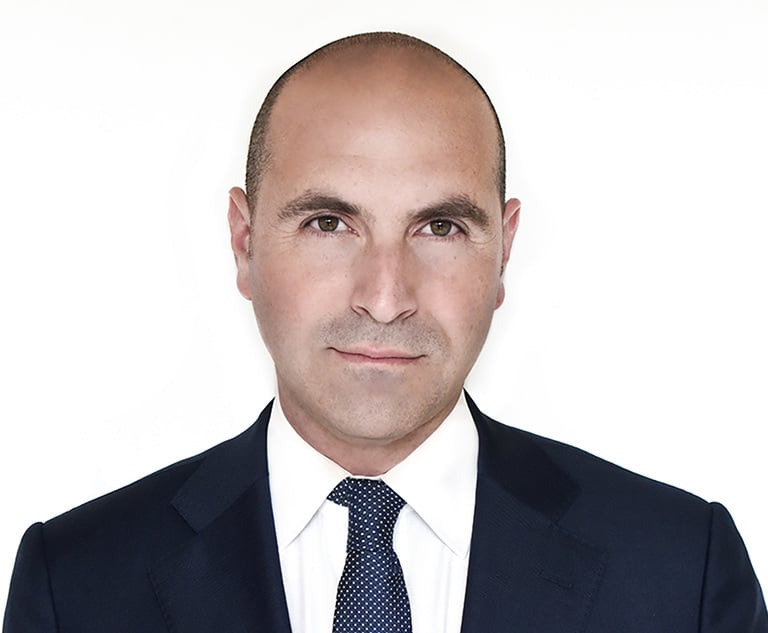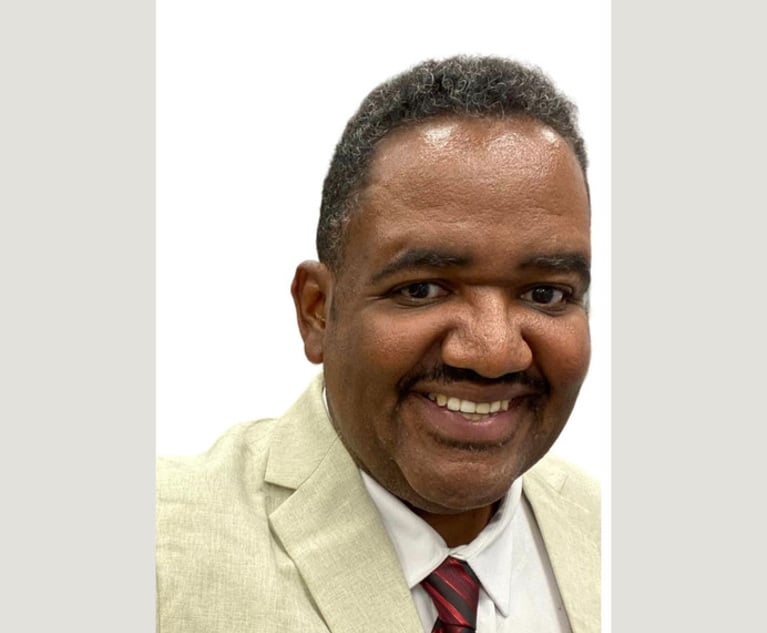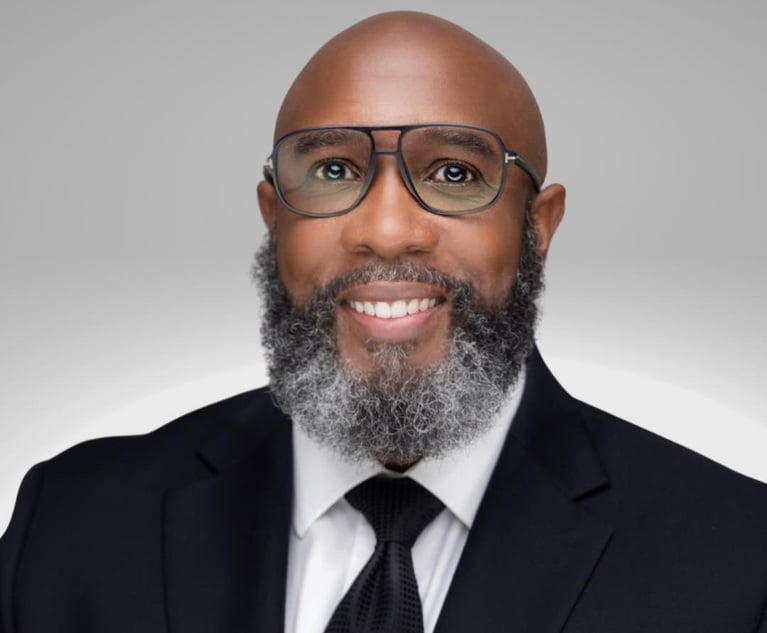 Miami-Dade Judge Scott Bernstein.
Miami-Dade Judge Scott Bernstein.Early Lessons in Injustice Shaped Miami-Dade Circuit Judge Scott Bernstein's Sense of Fairness
Scott Bernstein knew he wanted to be the type of judge who treated all those before him fairly, regardless of their circumstances.
June 29, 2020 at 03:27 PM
7 minute read
Since beginning his judicial career in 1998, Miami-Dade Circuit Judge Scott M. Bernstein has aspired to achieve judicial excellence in the operation of his courtroom and his interactions with litigants and the lawyers that represent them. In doing so, he looked beyond himself to achieve a broader mission of fairness and equality.
Bernstein was recognized for these efforts in 2019 by receiving the Chief Justice Award for Judicial Excellence, honoring his service to and leadership within Florida's judicial branch. It was mainstream recognition of a central tenet of his career. Florida Supreme Court Chief Justice Charles T. Canady presented the award to Bernstein on Aug. 9, 2019.
The foundation of Bernstein's legal career can trace its roots back to his childhood, when Bernstein learned some important lessons from his parents and grandmother.
When Bernstein was younger, his mother, a journalist, wanted to instill in him the ability to communicate clearly. But she did this in a way that some would find unusual and her son found somewhat humiliating. She encouraged him to write letters home from sleepaway camp, which she then critiqued.
"My mother would grade my letters with a red pen and send them back. And I laughed about it. Of course, as a child I was horrified," Bernstein said. "My writing skills that I learned through my mother's journalism served me extremely well all through college, and certainly through law school and definitely my legal profession."
But that was not the only major lesson Bernstein learned at a young age. The fairness concept was taught to him by his father and grandmother, who taught him about challenging the inequalities that other people experience.
His father sat on the board of the Anti-Defamation League and raised Bernstein to see the "evils in our society that had to be eradicated."
That lesson became apparent in a story from his grandmother. His grandmother raised Bernstein's mother in the Deep South.
"I remember my grandmother telling me that when my mother was very young, they were at a public building, and my mother ran over to a water fountain because it was hot out and she wanted to get a drink," Bernstein said. "My mother was too young to read the sign above the water fountain, which said: 'Colored,'" Bernstein said.
Bernstein's grandmother ran over to his mother and redirected her to a different water fountain. She looked at her grandson and said: "Can you believe, I thought there was a difference in the water?" Bernstein realized that these attitudes from an "unfair system," had existed in his own family, and were not just ancient history.
Bernstein was born in Miami in 1959. He earned his undergraduate degree from Vanderbilt University and his Juris Doctorate from the University of Florida. Bernstein was admitted to the Florida Bar in 1983.
Over the next 15 years, Bernstein primarily worked in private practice as a commercial litigator. Between 1996 and 1998, Bernstein also worked as a traffic magistrate. In 1998, Bernstein was elected as a judge to sit on the Miami-Dade Circuit Court in the family division, putting his broad legal experience to work on the bench.
"My practice was intellectually stimulating and financially rewarding, but I was always drawn to serving others," Bernstein said. "I didn't find the kind of emotional reward from the career I wanted. That's why I decided to become a judge."
Bernstein knew he wanted to be the type of judge that treated all those before him fairly, regardless of their circumstances. One of those ways was through the communication lessons his mother taught him at a young age when he wrote home from summer camp.
Bernstein said falling back on legalese when explaining a ruling to those who come before him at family court is just a sign of laziness. Many of the cases that come before him have involved self-represented litigants, and Bernstein said he must explain the law to the litigants in plain English that they can understand.
"Otherwise, they just feel I am being unfair to them if I rule against them; or feel inappropriately empowered if I rule in their favor," Bernstein said. "They need to know what the law is and I need to explain how it works."
While Deborah Baker, a partner in the litigation practice group at Sanchez-Medina, Gonzalez, Quesada, Lage, Gomez & Machado has not argued before Bernstein in family court, she said he is still one of her favorite judges.
"He's a known advocate for minority rights," Baker said. "He does a lot of diversity training with the judges and ensures new judges and the older judges who might need a refresher course are aware of implicit bias."
Bernstein has taught at the Florida Judicial College, the Florida College of Advanced Judicial Studies, the Conference of Circuit Court Judges, the Conference of County Court Judges, and the National Judicial College to elevate judicial performance among sitting judges. But there is one initiative where he has looked beyond his fellow judges, as well as the litigants in the courtroom, to one of his favorite missions: to ensure the safety of kids.
Bernstein helped found a not-for-profit organization, Kidside Miami, which has provided child care in a safe, educational environment for children from low-income families, while their parents are involved in cases in high-conflict cases in family court. Kidside provides children with critical protection, advocacy and the opportunity to heal.
"Kidside gives the kids food and books, and toys and art projects," Baker said, "instead of sitting in the courtroom, listening to their parents annihilate each other, which sadly has happened."
But Baker is not the only person who has admired Bernstein for his actions taken during his time as a judge in South Florida. Beyond being recognized for his judicial excellence, the Miami-Dade Chapter of the Florida Association of Women Lawyers has recognized Bernstein for his treatment of women, such as his unwavering support of parental leave in the legal profession.
When Bernstein was given the Theodore Klein Award in 2016 for his lifetime dedication in support of women's issues, Bernstein did something unusual, Baker said. Bernstein, who was the first male member of the association, didn't talk about himself at the podium.
"He talked about different issues, like diversity," Baker said. "That it's not just a word you sit around in a conference room talking about for six hours one day because you're forced to," Baker said.
As Bernstein approaches the end of his career, he is looking forward to having more time with his husband, Miami-Dade Circuit Court Judge David Young. Young was the first openly gay TV judge, when he hosted his first syndicated court show. They balance each other, as Bernstein tends to be introverted while Young is extroverted.
"When he was nominated for an Emmy, we walked the Red Carpet out in LA on National TV," Bernstein said. "Who would have ever thought we'd be doing that?"
Until retirement, Young has planned to continue giving the families who come to his court the same level of attention and service they had before the coronavirus outbreak. His analytical mindset is among the reasons Bernstein is beloved in South Florida and has been repeatedly honored for his work.
"I've always had an innate sense of the basic code of fairness that everyone be treated equally before the law," Bernstein said.
Scott M. Bernstein
Born: 1959, Miami
Spouse: David Young
Education: J.D. University of Florida, 1983; B.A. Vanderbilt University, 1981.
Experience: Miami-Dade Circuit Judge 1999-current; private practice, commercial litigation and appeals, 1983-1998
This content has been archived. It is available through our partners, LexisNexis® and Bloomberg Law.
To view this content, please continue to their sites.
Not a Lexis Subscriber?
Subscribe Now
Not a Bloomberg Law Subscriber?
Subscribe Now
NOT FOR REPRINT
© 2024 ALM Global, LLC, All Rights Reserved. Request academic re-use from www.copyright.com. All other uses, submit a request to [email protected]. For more information visit Asset & Logo Licensing.
You Might Like
View All
Growing Referral Network, Alternative Fees Have This Ex-Big Law’s Atty’s Bankruptcy Practice Soaring
5 minute read
Against the Odds: Voters Elect Woody Clermont to the Broward Judicial Bench
4 minute read
Miami Civil Judge Myriam Lehr to Say Goodbye to the County Court Bench
4 minute readTrending Stories
Who Got The Work
Michael G. Bongiorno, Andrew Scott Dulberg and Elizabeth E. Driscoll from Wilmer Cutler Pickering Hale and Dorr have stepped in to represent Symbotic Inc., an A.I.-enabled technology platform that focuses on increasing supply chain efficiency, and other defendants in a pending shareholder derivative lawsuit. The case, filed Oct. 2 in Massachusetts District Court by the Brown Law Firm on behalf of Stephen Austen, accuses certain officers and directors of misleading investors in regard to Symbotic's potential for margin growth by failing to disclose that the company was not equipped to timely deploy its systems or manage expenses through project delays. The case, assigned to U.S. District Judge Nathaniel M. Gorton, is 1:24-cv-12522, Austen v. Cohen et al.
Who Got The Work
Edmund Polubinski and Marie Killmond of Davis Polk & Wardwell have entered appearances for data platform software development company MongoDB and other defendants in a pending shareholder derivative lawsuit. The action, filed Oct. 7 in New York Southern District Court by the Brown Law Firm, accuses the company's directors and/or officers of falsely expressing confidence in the company’s restructuring of its sales incentive plan and downplaying the severity of decreases in its upfront commitments. The case is 1:24-cv-07594, Roy v. Ittycheria et al.
Who Got The Work
Amy O. Bruchs and Kurt F. Ellison of Michael Best & Friedrich have entered appearances for Epic Systems Corp. in a pending employment discrimination lawsuit. The suit was filed Sept. 7 in Wisconsin Western District Court by Levine Eisberner LLC and Siri & Glimstad on behalf of a project manager who claims that he was wrongfully terminated after applying for a religious exemption to the defendant's COVID-19 vaccine mandate. The case, assigned to U.S. Magistrate Judge Anita Marie Boor, is 3:24-cv-00630, Secker, Nathan v. Epic Systems Corporation.
Who Got The Work
David X. Sullivan, Thomas J. Finn and Gregory A. Hall from McCarter & English have entered appearances for Sunrun Installation Services in a pending civil rights lawsuit. The complaint was filed Sept. 4 in Connecticut District Court by attorney Robert M. Berke on behalf of former employee George Edward Steins, who was arrested and charged with employing an unregistered home improvement salesperson. The complaint alleges that had Sunrun informed the Connecticut Department of Consumer Protection that the plaintiff's employment had ended in 2017 and that he no longer held Sunrun's home improvement contractor license, he would not have been hit with charges, which were dismissed in May 2024. The case, assigned to U.S. District Judge Jeffrey A. Meyer, is 3:24-cv-01423, Steins v. Sunrun, Inc. et al.
Who Got The Work
Greenberg Traurig shareholder Joshua L. Raskin has entered an appearance for boohoo.com UK Ltd. in a pending patent infringement lawsuit. The suit, filed Sept. 3 in Texas Eastern District Court by Rozier Hardt McDonough on behalf of Alto Dynamics, asserts five patents related to an online shopping platform. The case, assigned to U.S. District Judge Rodney Gilstrap, is 2:24-cv-00719, Alto Dynamics, LLC v. boohoo.com UK Limited.
Featured Firms
Law Offices of Gary Martin Hays & Associates, P.C.
(470) 294-1674
Law Offices of Mark E. Salomone
(857) 444-6468
Smith & Hassler
(713) 739-1250







